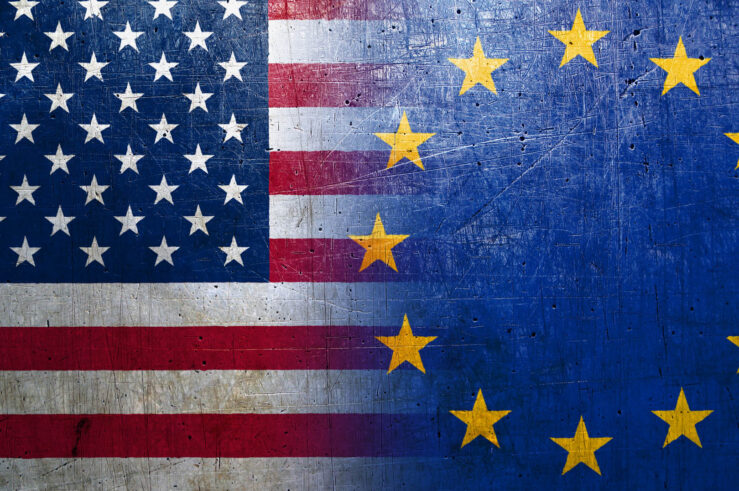Showing archive for: “Duty to Deal & Essential Facilities”
How US and EU Competition Law Differ
U.S. and European competition laws diverge in numerous ways that have important real-world effects. Understanding these differences is vital, particularly as lawmakers in the United States, and the rest of the world, consider adopting a more “European” approach to competition. In broad terms, the European approach is more centralized and political. The European Commission’s Directorate ... How US and EU Competition Law Differ
NY ‘Abuse of Dominance’ Bill Attacks Consumer Welfare and the US Antitrust Tradition
U.S. antitrust law is designed to protect competition, not individual competitors. That simple observation lies at the heart of the Consumer Welfare Standard that for years has been the cornerstone of American antitrust policy. An alternative enforcement policy focused on protecting individual firms would discourage highly efficient and innovative conduct by a successful entity, because ... NY ‘Abuse of Dominance’ Bill Attacks Consumer Welfare and the US Antitrust Tradition
The Digital Markets Act Shouldn’t Mandate Radical Interoperability
Despite calls from some NGOs to mandate radical interoperability, the EU’s draft Digital Markets Act (DMA) adopted a more measured approach, requiring full interoperability only in “ancillary” services like identification or payment systems. There remains the possibility, however, that the DMA proposal will be amended to include stronger interoperability mandates, or that such amendments will ... The Digital Markets Act Shouldn’t Mandate Radical Interoperability
The Antitrust Prohibition of Favoritism, or the Imposition of Corporate Selflessness
It is my endeavor to scrutinize the questionable assessment articulated against default settings in the U.S. Justice Department’s lawsuit against Google. Default, I will argue, is no antitrust fault. Default in the Google case drastically differs from default referred to in the Microsoft case. In Part I, I argue the comparison is odious. Furthermore, in ... The Antitrust Prohibition of Favoritism, or the Imposition of Corporate Selflessness
Buck’s “Third Way”: A Different Road to the Same Destination
Congressman Buck’s “Third Way” report offers a compromise between the House Judiciary Committee’s majority report, which proposes sweeping new regulation of tech companies, and the status quo, which Buck argues is unfair and insufficient. But though Buck rejects many of the majority’s reports proposals, what he proposes instead would lead to virtually the same outcome ... Buck’s “Third Way”: A Different Road to the Same Destination
A Law & Economics Perspective on Ruth Bader Ginsburg
With the passing of Justice Ruth Bader Ginsburg, many have already noted her impact on the law as an advocate for gender equality and women’s rights, her importance as a role model for women, and her civility. Indeed, a key piece of her legacy is that she was a jurist in the classic sense of ... A Law & Economics Perspective on Ruth Bader Ginsburg
Will Montesquieu Rescue Antitrust?
In an age of antitrust populism on both ends of the political spectrum, federal and state regulators face considerable pressure to deploy the antitrust laws against firms that have dominant market shares. Yet federal case law makes clear that merely winning the race for a market is an insufficient basis for antitrust liability. Rather, any ... Will Montesquieu Rescue Antitrust?
Why the FTC had to Abandon the Duty to Deal Argument Against Qualcomm
On November 22, the FTC filed its answering brief in the FTC v. Qualcomm litigation. As we’ve noted before, it has always seemed a little odd that the current FTC is so vigorously pursuing this case, given some of the precedents it might set and the Commission majority’s apparent views on such issues. But this ... Why the FTC had to Abandon the Duty to Deal Argument Against Qualcomm
It’s Time to Let STELA Go Off Into the Sunset and Reform Video Marketplace Regulation
Every 5 years, Congress has to reauthorize the sunsetting provisions of the Satellite Television Extension and Localism Act (STELA). And the deadline for renewing the law is quickly approaching (Dec. 31). While sunsetting is, in the abstract, seemingly a good thing to ensure rules don’t become outdated, there are an interlocking set of interest groups ... It’s Time to Let STELA Go Off Into the Sunset and Reform Video Marketplace Regulation
Does Apple’s “Discrimination” Against Rival Apps in the App Store harm Consumers?
A spate of recent newspaper investigations and commentary have focused on Apple allegedly discriminating against rivals in the App Store. The underlying assumption is that Apple, as a vertically integrated entity that operates both a platform for third-party apps and also makes it own apps, is acting nefariously whenever it “discriminates” against rival apps through ... Does Apple’s “Discrimination” Against Rival Apps in the App Store harm Consumers?
The District Court’s FTC v. Qualcomm Decision Rests on Impermissible Inferences and Should Be Reversed
Last week the International Center for Law & Economics (ICLE) and twelve noted law and economics scholars filed an amicus brief in the Ninth Circuit in FTC v. Qualcomm, in support of appellant (Qualcomm) and urging reversal of the district court’s decision. The brief was authored by Geoffrey A. Manne, President & founder of ICLE, and ... The District Court’s FTC v. Qualcomm Decision Rests on Impermissible Inferences and Should Be Reversed
Breaking Up: “It’s Not You, It’s Me”, “Maybe We Should See Other People” and “with or without You”
[This post is the second in an ongoing symposium on “Should We Break Up Big Tech?” that will feature analysis and opinion from various perspectives.] [This post is authored by Philip Marsden, Bank of England & College of Europe, IG/Twitter: @competition_flaneur] Since the release of our Furman Report, I have been blessed with an uptick in #antitrusttourism. ... Breaking Up: “It’s Not You, It’s Me”, “Maybe We Should See Other People” and “with or without You”









